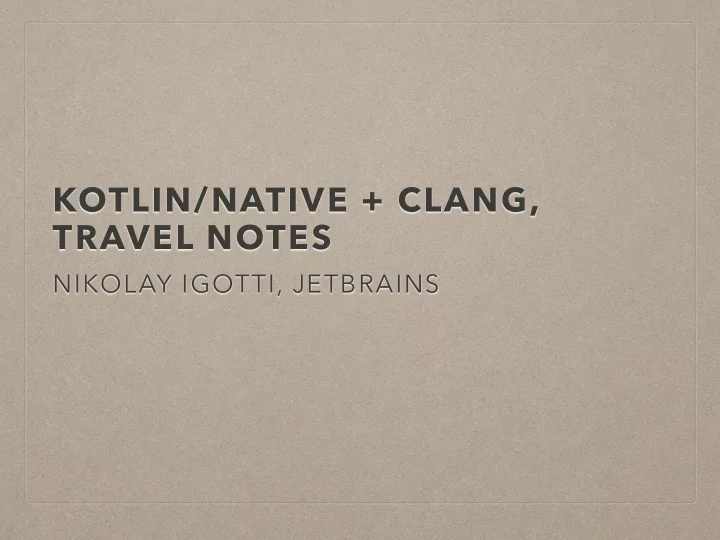

KOTLIN/NATIVE + CLANG, TRAVEL NOTES NIKOLAY IGOTTI, JETBRAINS
KOTLIN IS… NOT JUST AN ISLAND
KOTLIN LANGUAGE • FP and OOP language • Type inference, smart casts, nullability checks • Generics (erased, with reification and controlled variance) • Rich standard library (collections, regexes, etc.), coroutines • Unchecked runtime exceptions • Transparent boxing (primitive types are formally objects) • Automated memory management, need to collect cycles • Transparent interoperability with the platform (JVM, JS, C, Objective-C) 3
KOTLIN/NATIVE • Kotlin -> platform binaries (ELF, COFF, Mach-O, WASM) • Targets iOS, macOS, Linux, Windows, WebAssembly and embedded (x86, ARM, MIPS) • Currently uses LLVM 5.0, compiler written in Kotlin/JVM, runtime in Kotlin/Native and C++ • Provide runtime guarantees (exceptions, memory management) similar to JVM in VM-less environment • Automated interoperability with C/Objective-C using libclang • Broad set of platform libraries (POSIX, Apple frameworks, Win32, W3C DOM, etc.) 4
LLVM INTEGRATION • Produce bitcode from Kotlin code with LLVM API • Produce bitcode from the C++ runtime with clang • Link and generate code with llvm-lto • Kotlin LLVM API is autogenerated from LLVM C bindings with a generic interop tool • Closed world, DCE and optimizations
KOTLIN/NATIVE COMPILER • Shares frontend with Kotlin/JVM and Kotlin/JS • Source code -> high level IR • Multiple lowering passes on IR • Devirtualization, escape analysis • Bitcode generation from lowered IR • LLVM (llc, ld) tools to generate final binaries • Own library format: Kotlin metadata + bitcode • Non-optimizing, most optimisations come from LLVM 6
INTERESTING COMPILER ASPECTS • Simple top down codegen from AST-like lowered HIR • Complex stuff (coroutines, lambda capturing) is performed in lowerings • Memory management requires specific LLVM function organisation • Basic block termination is hard to get right (no DCE pass) • Kotlin null safety helps in codegen • Optimise very specific operations (virtual dispatch, memory management) • Library format uses serialized Kotlin metadata for linking 7
MEMORY MANAGEMENT • ARC, with the cycle collector • Compiler does not know about RC, just maintains root set • Disjoint object graph for different threads • Object subgraphs can be transferred between threads • Immutable objects can be shared (object freezing) • Root set is maintained per call frame • Leak detection mechanism, abort on leaked memory • C sees raw pointers to data, Objective-C sees its objects 8
EXCEPTION HANDLING • Relies on landing pads mechanism • Structure matches AST/HIR • Uses C++ personality function • Throw using C++ ‘throw’ keyword • Exception object memory managed by C++ wrapper • Transparently interleaves with C++/Objective-C frames • Unsupported for some targets (WebAssembly) 9
INTEROPERABILITY • Mostly transparent interoperability with C, Objective-C (and thus Swift) • Kotlin calls C/Objective-C, C/Objective-C calls Kotlin (in OOP manner) • Kotlin extends Objective-C classes and vice versa • Numbers passed as is, strings converted, collections and classes wrapped • Memory manager aware of Objective-C runtime, and accounts properly • For C Kotlin declaration wrapping C entities (functions, structs, unions, macroses, typedefs, etc.) are autogenerated • For Objective-C OOP concepts (classes, protocols, blocks) are represented as matching Kotlin entities (classes, interfaces, lambdas) • For Objective-C Kotlin code can be compiled to the framework 10
DEBUGGABILITY • Use LLVM C++ debugging APIs • Wrapped to C for interop sake • Produce DWARF/dSYM in final binaries • Breakpoints/single stepping works • Evaluation works partially • XCode has issues setting breakpoints in Kotlin code • Verifier helps 11
WEBASSEMBLY • Nothing but CPU, RAM and JS calls • No libc, dlmalloc for memory allocator • Not in standard LLVM builds • No exceptions • No debugging • No JS object memory management integration • Works! 12
PROBLEMS WITH LLVM • API is not ideally documented • Not all APIs available from C bindings • Mysterious crashes (LLVMVerifyModule() helps) • Debugger API had to be reversed from clang • Missing public LLDB plugin API • Exception handling API sometimes convoluted • Artificially incompatible bitcode for different architectures • Slow codegeneration and linking 13
NICE THINGS ABOUT LLVM • Great LIR • libclang allows interoperability without much ado • Well tested, few code generator and optimiser bugs • Wide range of supported platforms • High quality code is produced • Natural API 14
Your questions! – igotti@gmail.com 15
Recommend
More recommend